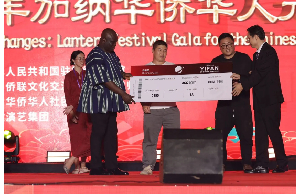Former Deputy Minister of Education, Samuel Okudzeto Ablakwa has exposed the Member of Parliament for Dome Kwabenya, Sarah Adwoa Safo, that she personally facilitated the construction of one government’s E-Blocks in her constituency.
According to her, she negotiated with the World Bank directly to build a community day school in her constituency adding that that the Senior High School was not from the then NDC Government and that with the exception of the Dome/Kwabenya Senior High School project, all the other schools constructed during the previous NDC administration were executed in NDC strongholds.
But colleague Member of Parliament (MP) North Tongu who in response, disagreed with the claims of the Minister of State in charge of Procurement insisting the structure was done by the former government.
Read full text of response below
My attention has been drawn to a video which captures the Member of Parliament for Dome/Kwabenya, Deputy Majority Leader and Minister of State at the Presidency in charge of Public Procurement, the Hon. Sarah Adwoa Safo claiming in the said video that the Community Senior High School constructed and commissioned in her constituency during the tenure of President John Dramani Mahama was as a result of her personal intervention with the World Bank, that the Senior High School was not from the then NDC Government and that with the exception of the Dome/Kwabenya Senior High School project, all the other schools constructed during the previous NDC administration were executed in NDC strongholds.
As Deputy Minister who served at the Ministry of Education when these iconic President Mahama flagship schools were constructed, and considering the avalanche of calls from the media seeking clarification and a reaction from me to the video in issue, I wish to set the record straight as follows:
Background
President John Dramani Mahama promised during the 2012 electioneering campaign to construct some 200 Community Day Senior High Schools when elected.
Under the dynamic and able leadership of Prof. Naana Jane Opoku-Agyemang, the Minister for Education who President Mahama appointed to oversee the Education sector and actualize his vision, the Ministry of Education carried out the following activities for the new construction:
1) Prepared criteria for selecting Districts and towns to benefit from the project.
2) Prepared the Programmes to be offered in Schools at each of the selected Districts.
3) Determined the optimum size of land needed to run the various Programmes and secured all land through the various District Assemblies needed for the new schools including land for the Dome Kwabenya project.
4) Carried out Case Studies of existing Schools.
5) Determined the structures necessary to run the various Programmes.
6) Designed the various structures by taking into consideration the Employer’s Brief and ways of making the designs attractive but very cost effective.
7) Prepared a costing of the structures designed.
8) Decided on how to phase the project implementation.
District selection criteria
The following criteria were used to select Districts that would benefit from the programme:
(a) All the 46 new districts that were established in 2012 except those that already have public Senior High Schools
(b) All other districts that do not have public Senior High Schools.
(c) Districts that have very high Junior High School enrolments than available schools can accommodate.
It should be noted that when we settled on the criteria above, it was established that apparently, there were 23 Districts in Ghana without a Senior High School and this included Ga East Municipal which hosts the Dome/Kwabenya constituency.
Clearly, an objective and fair criteria was pursued by the NDC Government in selecting beneficiary Districts. President Mahama was President for all of Ghana including the Dome/Kwabenya constituency and NOT just NDC strongholds.
Designs
Designs for the following structures inter alia were prepared:
Security and Gate House
4-storey 24-unit Classroom Block (E-Block)
Technical/Vocational Block
Canteen Block
3-Bedroom School Head’s Bungalow with 2-bedroom Outhouse
4-storey Block of 8 No. 2-Bedroom Staff Flats
Owing to funding constraints, Government decided to start the project by constructing an E-Block in each beneficiary District except the 23 World Bank funded projects which came with the full complement after successful negotiations led by Prof. Naana Jane Opoku-Agyemang . The other structures would be added on as future phases of the project. Each school was expected to cater for 1,080 students when it is fully operational with a contract completion period of 18 months from the contract start date.
The E-Block is a 4-level E-shaped structure with three fingers measuring 30.15m x10.75m; 32.55m x 9.80m; 32.55m x 9.80m and a stem measuring 54.00m x 8.65m on plan. The overall height of the structure is 16.55m. The E-Block has space for 24 Classrooms; 4 Laboratories (Integrated Science; Physics; Chemistry; Biology); 2 Libraries; 8 Offices for Departmental Heads; ICT Laboratories software/hardware and Internet Learning area.
World Bank Support
President John Dramani Mahama approached the World Bank to support his vision for Secondary Education in Ghana.
This proposal received favourable response with Minister of Education, Prof. Naana Jane Opoku-Agyemang leading a delegation that comprised Hon. Alex Kyeremeh (Deputy Minister, Pre-Tertiary), Enoch Cobbinah (Chief Director) and other technical staff of the Ministry to the World Bank Headquarters in Washington, D.C., United States of America to negotiate a $156 million facility for what became known as the Ghana Secondary Education Improvement Project (SEIP)
The Secondary Education Improvement Project was approved by the World Bank Board on May 20, 2014 for an amount of US$156 million (IDA), signed on July 30, 2014, declared effective on October 3, 2014, and launched on November 4, 2014 by President John Dramani Mahama.
The project was restructured on August 30, 2016 to ensure reallocation among disbursement categories and revise the percentage of expenditures to be financed for all categories up to 100% financing. This was to allow more flexibility in project implementation and to ensure that activities are not held back given the results-based nature of the project.
The Project Development Objective is to increase access to senior secondary education in underserved districts and improve quality in low-performing senior high schools (SHSs) in Ghana. This is a five-year IPF closing on November 30, 2019. It uses a results based financing approach under the first component which aims to increase access with equity and quality in SHSs.
Component One comprises Pillar 1 and 2 as follows:
The first results area (Pillar 1) aims to expand senior secondary places through the construction of 23 new SHS in underserved districts including Dome Kwabenya; rehabilitate and expand 50 existing low performing SHSs and support attainment of disadvantaged students (e.g., through scholarships to 10,400 students from low income families, especially girls).
The second results area (Pillar 2) focuses on improving the quality of education in 125 selected low-performing SHS through: (i) strengthened school management and accountability; (ii) improved mathematics and science teaching and learning; (iii) expanded information, communication technology and internet connectivity in schools; and (iv) the implementation of school performance partnership plans.
Component Two uses a traditional investment approach to finance technical assistance, management, research and monitoring and evaluation for effective project implementation.
I shall provide an addendum to this response of a tabular guide of project locations under the various phases including the World Bank funded projects which do not and cannot support the assertion by the Hon. Sarah Adwoa Safo that the Community Senior High Schools were constructed in only NDC strong holds.
May I conclude by quoting Loretta Young who famously said: “Giving credit where credit is due is a very rewarding habit to form. Its rewards are inestimable.”
God bless the motherland.
Samuel Okudzeto Ablakwa (MP)
[Former Deputy Minister of Education]
General News of Friday, 7 July 2017
Source: mynewsgh.com













